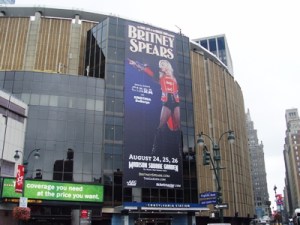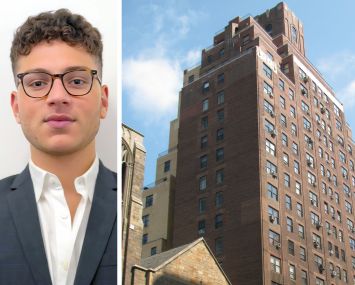Opponents and Defenders of MSG Spar at Planning Commission Hearing
By Gus Delaporte April 11, 2013 4:45 pm
reprintsShortly into yesterday’s City Planning Commission public hearing on the special permit application for Madison Square Garden—an event that would stretch into the evening—a comparison to Brooklyn’s Barclays Center was made. It was an early indication of what would be a recurring theme throughout the day.
A number of obstacles facing the Garden, from its age and inferior infrastructure to its request for special signage, were brought to the fore as Planning Commissioner Amanda Burden heard from a list of 50 speakers, ranging from State Assemblyman Richard Gottfried to former New York Knick Larry Johnson, he of the four-point play.
 Defenders of Madison Square Garden’s request to renew its special permit to operate an arena in perpetuity point to the competitive environment its finds itself in these days, with the newly built Barclays Center a short subway ride away from the bowels of the arena. The Garden’s $1 billion renovation plan—two thirds complete—was inevitable and unavoidable in the competitive landscape, they claimed.
Defenders of Madison Square Garden’s request to renew its special permit to operate an arena in perpetuity point to the competitive environment its finds itself in these days, with the newly built Barclays Center a short subway ride away from the bowels of the arena. The Garden’s $1 billion renovation plan—two thirds complete—was inevitable and unavoidable in the competitive landscape, they claimed.
“[Madison Square Garden] couldn’t wait,” Elise Wagner, partner at Kramer Levin, said on behalf of the Garden. “They were in a competitive environment with Barclays being built and they decided to invest.”
Weaknesses brought into the open included the Garden’s inferior loading facilities, which are inadequately sized to accommodate modern trucking. Citing the Barclays Center’s ability to seamlessly handle trucking, Ms. Burden asked Joel Fisher, executive vice president at Madison Square Garden, how many trucks the arena can accommodate.
“We can’t bring any semis in,” Mr. Fisher replied.
“That’s exactly right,” Ms. Burden said.
The question was continually raised as to whether the term on Madison Square Garden’s permit should be limited to 10 years, or some other period of time, to allow the arena to amortize its current investment. The Garden’s defenders challenged the notion.
“From a business point of view, if there’s a term [to the permit] and [the public] knows there’s a term, the Garden would have difficulty getting events,” Ms. Wagner said, acknowledging the threat posed by the Barclays Center in what was, until recently, a one-arena city.
Mr. Gottfried further challenged the Commission to answer what a limited term would accomplish. “[The Garden] could be expected to amortize its investment over 40 to 50 years, any permit should be at least 25 years,” he said.
However, the investment itself was challenged by some members of the Commission, the most vocal of which may have been Irwin Cantor, who declared: “If you put lipstick on a pig, it’s still a pig.”
It will take time for the Commission to process the testimony it heard yesterday. Though a vote on the Garden’s future was a possibility, Ms. Burden put the notion to rest early in her remarks.
“Today is a time for us to listen, to ask questions and to learn the facts,” she said.
As part of the Uniform Land Use Review Procedure, a vote needs to be made by the end of May and is likely to take place at the Commission’s hearing on May 22. Following a vote, the process will proceed to review by the City Council.


